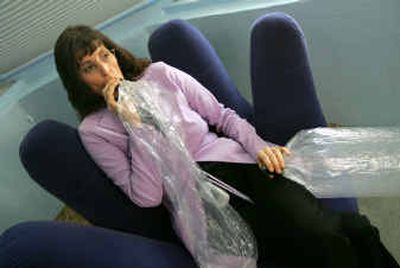High court to weigh medical pot laws

OAKLAND, Calif. – Traditional drugs have done little to help 39-year-old Angel Raich.
Beset by a nightmarish list of ailments that includes tumors in her brain and uterus, seizures, spasms and nausea, she has been able to find comfort only in the marijuana that is recommended by her doctor.
It eases her pain, allows her to rise out of a wheelchair and promotes an appetite that prevents her from wasting away.
Her Berkeley physician, Frank Lucido, said marijuana “is the only drug of almost three dozen we have tried that works.”
On Monday, the Supreme Court will hear arguments in a case that will determine whether Raich and similar patients in California and 10 other states can continue to use marijuana for medical purposes.
At issue is whether states have the right to adopt laws allowing the use of drugs the federal government has banned or whether federal drug agents can arrest individuals for abiding by those laws.
California passed the nation’s first medical marijuana law in 1996, allowing patients to smoke and grow marijuana with a doctor’s recommendation. The Bush administration maintains those laws violate federal drug rules and that marijuana has no medical value.
“I really hope and pray the justices allow me to live,” said Raich as she crammed a blend of a marijuana variety known as “Haze X” into a contraption that vaporized it inside large balloons.
She said the outcome will determine whether her “husband will have a wife,” her “children a mother.”
In 2001, the justices ruled against clubs that distributed medical marijuana, saying they cannot do so based on the “medical necessity” of the patient. The ruling forced Raich’s Oakland supplier to close and other cannabis clubs to operate in the shadows.
The decision did not address whether the government can block states from adopting their own medical marijuana laws.
Nevertheless, the federal government took the offensive after the ruling. It began seizing individuals’ medical marijuana and raiding their suppliers. Nowhere was that effort more conspicuous than in the San Francisco Bay area, where the nation’s medical marijuana movement was founded.
Raich and Diane Monson, the other plaintiff in the case, sued Attorney General John Ashcroft because they feared their supplies of medical marijuana might dry up. After a two-year legal battle, they won injunctions barring the U.S. Justice Department from prosecuting them or their suppliers.
“This has been a nightmare,” said Monson, a 47-year-old accountant from Oroville whose backyard crop of six marijuana plants was seized in 2002. “I’ve never sued anyone in my life, never mind the attorney general of the United States of America. For crying out loud, here in California we’ve voted to allow medical marijuana.”
She regularly uses marijuana on a doctor’s recommendation to alleviate back problems.
Last December, the San Francisco-based 9th U.S. Circuit Court of Appeals ruled in Raich’s and Monson’s favor. It said federal laws criminalizing marijuana do not apply to patients whose doctors have recommended the drug.
The same court last year said doctors were free to recommend marijuana to their patients. The government appealed, but the Supreme Court justices declined to hear the case. In June, however, the justices agreed to hear the Raich-Monson case.
A number of medical groups, doctors and marijuana supporters wrote the court, saying marijuana benefits sick patients.
Raich, whose legal team includes her husband, Robert, said she hopes the chemotherapy Chief Justice William H. Rehnquist is undergoing for thyroid cancer “would soften his heart about the issue.”
“I think,” she said, “he would find that cannabis would help him a lot.”